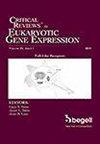Foxm1-mediated transcriptional inactivation of NLRP3 inflammasome promotes immunosuppression in cervical cancer
IF 1.5
4区 医学
Q4 BIOTECHNOLOGY & APPLIED MICROBIOLOGY
Critical Reviews in Eukaryotic Gene Expression
Pub Date : 2024-05-01
DOI:10.1615/critreveukaryotgeneexpr.2024053577
引用次数: 0
Abstract
Foxm1 function as an oncogene in multiple human malignancies, including cervical cancer. However, the potential of Foxm1 in the tumor microenvironment (TME) is still unknown. The purpose of the present study is to investigate the role of Foxm1 in CD8+ T cell anti-tumor immunity. RT-qPCR is conducted to calculate mRNA levels. JASPAR is used to predict the binding sites between Foxm1 and NLRP3. ChIP assay is performed to verify the occupancy of Foxm1 on the promoter of NLRP3. Modulatory relationship between Foxm1 and NLRP3 is verified by luciferase assay. In vivo assays are conducted to further verify the role of Foxm1/NLRP3 axis in cervical cancer. HE staining assay is applied for histological analysis. Fow cytometry is conducted to determine the functions of immune cells. We found that Foxm1 knockdown decreases tumor burden and suppresses tumor growth of cervical cancer. Foxm1 knockdown promotes the infiltration of CD8+ T cells. Foxm1 deficiency inhibits the exhaustion of CD8+ T cells and facilitates the maintenance of CD8+ effector and stem-like T cells. Moreover, Foxm1 transcriptionally inactivates NLRP3 and suppressed the expression of innate cytokines IL-1β and IL-18. However, inhibition of NLRP3 inflammasome or neutralizing IL-1β and IL-18 inhibits anti-tumor immunity and promoted tumor growth in Foxm1 deficiency in CD8+ T cells. In summary, targeting Foxm1 mediates the activation of NLRP3 inflammasome and stimulates CD8+ T cell anti-tumor immunity in cervical cancer.Foxm1 介导的 NLRP3 炎症小体转录失活可促进宫颈癌的免疫抑制
Foxm1 在包括宫颈癌在内的多种人类恶性肿瘤中发挥着癌基因的功能。然而,Foxm1在肿瘤微环境(TME)中的潜能仍然未知。本研究旨在探讨 Foxm1 在 CD8+ T 细胞抗肿瘤免疫中的作用。通过 RT-qPCR 计算 mRNA 水平。使用 JASPAR 预测 Foxm1 与 NLRP3 的结合位点。进行 ChIP 检测以验证 Foxm1 在 NLRP3 启动子上的占据情况。通过荧光素酶试验验证 Foxm1 和 NLRP3 之间的调节关系。进行体内试验,进一步验证 Foxm1/NLRP3 轴在宫颈癌中的作用。采用 HE 染色法进行组织学分析。通过福氏细胞计数法确定免疫细胞的功能。我们发现,敲除 Foxm1 能减少宫颈癌的肿瘤负荷并抑制肿瘤生长。Foxm1 基因敲除可促进 CD8+ T 细胞的浸润。Foxm1 缺乏可抑制 CD8+ T 细胞的衰竭,促进 CD8+ 效应细胞和干样 T 细胞的维持。此外,Foxm1 还能使 NLRP3 转录失活,并抑制先天性细胞因子 IL-1β 和 IL-18 的表达。然而,抑制NLRP3炎性体或中和IL-1β和IL-18会抑制抗肿瘤免疫,并促进Foxm1缺乏的CD8+ T细胞的肿瘤生长。综上所述,靶向Foxm1可介导NLRP3炎性体的活化并刺激CD8+ T细胞的抗肿瘤免疫。
本文章由计算机程序翻译,如有差异,请以英文原文为准。
求助全文
约1分钟内获得全文
求助全文
来源期刊

Critical Reviews in Eukaryotic Gene Expression
生物-生物工程与应用微生物
CiteScore
2.70
自引率
0.00%
发文量
67
审稿时长
1 months
期刊介绍:
Critical ReviewsTM in Eukaryotic Gene Expression presents timely concepts and experimental approaches that are contributing to rapid advances in our mechanistic understanding of gene regulation, organization, and structure within the contexts of biological control and the diagnosis/treatment of disease. The journal provides in-depth critical reviews, on well-defined topics of immediate interest, written by recognized specialists in the field. Extensive literature citations provide a comprehensive information resource.
Reviews are developed from an historical perspective and suggest directions that can be anticipated. Strengths as well as limitations of methodologies and experimental strategies are considered.
 求助内容:
求助内容: 应助结果提醒方式:
应助结果提醒方式:


